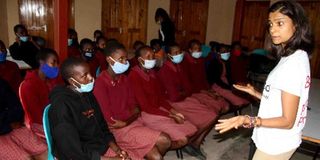Lest we forget, ‘women’s issues’ are also human issues

Dr Madhvi Dalal, a volunteer who distributes reusable sanitary towels to girls from vulnerable pastoral communities speaks to pupils of Mara Girls' Leadership Primary School, in Narok West Sub-county on February 13, 2021.
Should “women’s issues” matter only if you are related to a woman either by blood or marriage? Don’t answer this question yet. At least, not before you read about its genesis. You have probably exclaimed or heard people cry: “It could be my sister, daughter, mother or wife!” while sympathising with victims and survivors of domestic or sexual violence. Or with any other atrocities against women. Why is it so?
It’s a well-meaning phrase, by any standards, but it’s what lies underneath the thick veil of concern that’s worrying. Hackneyed as it may be, the saying about the road to hell being paved with good intentions is the most apt description of this phrase.
This is because “women’s issues” are human rights issues. It might seem like an obvious or even trivial point, but the thick line that separates women’s rights and human rights tells a different story. Such distinctions give birth to marginalisation and discrimination, and women bear the brunt. Always.
Take the discussion around sanitary towels, for instance. Is it a woman issue or a human issue? Let’s introduce a main character in this short story for better context. In August 2020, Education Cabinet Secretary Prof George Magoha dismissed as “hogwash” the link between sanitary towels and teenage pregnancies, explaining that, growing up, he never knew that his sister was having menses because his parents took absolute control. The good professor’s attitude is a mirror of the society’s that menses are a woman’s issue, to be dealt with in discretion and DCI-level secrecy.
Poverty
But that’s absurd, for research has shown that period poverty is a societal issue. A human issue. Period poverty keeps girls out of school, from socialising and other activities that they should enjoy alongside boys. Sanitary towels are as essential as toilet paper, but cost five times more. That condoms are cheaper than pads also says a lot about the societal attitude towards “women’s issues”.
Everybody should care about things that affect women because they are human, not because they could be related to the said humans. To distinguish “women’s issues” from human issues is to deny that everything a woman undergoes — from birth to death — concerns humanity. Reducing a woman’s experience to “women’s issues” minimises her humanity.
This year’s International Women’s Day campaign theme is #ChooseToChallenge with the idea that a challenged world is an alert world, and individually, we’re all responsible for our thoughts and actions. I hope that you will choose to challenge your perceptions about “women’s issues”. And that your Aha! moment will come from knowing that underneath the biological differences, women and men are human beings trying to live their best lives.
And don’t embrace “women’s issues” because “they could be our mothers, sisters, daughters or wives,” but because women are human.
[email protected]; @FaithOneya





